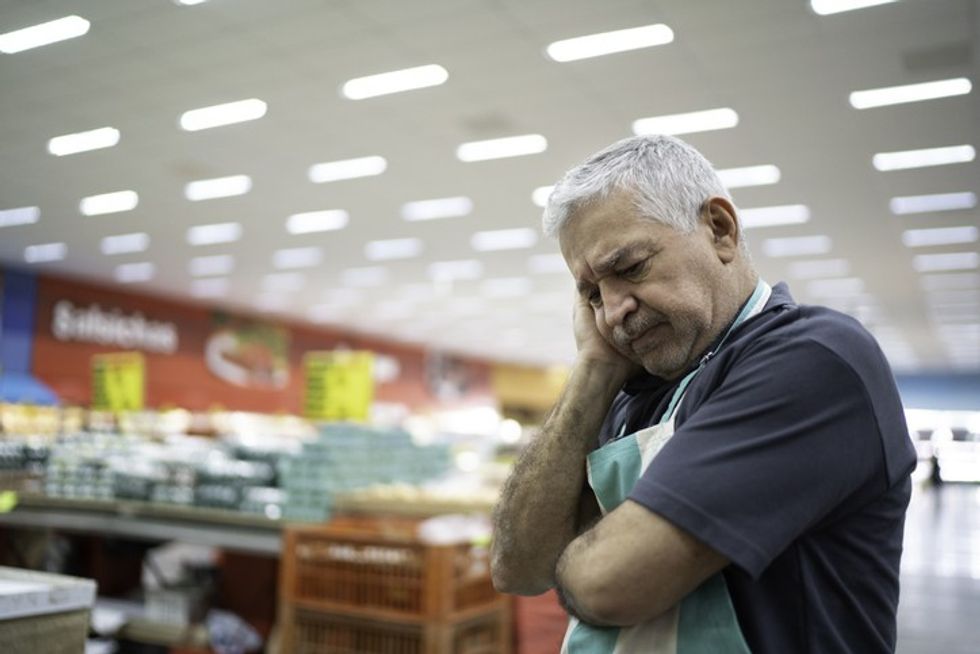Life of a shop worker in the current times is laced with uncertainty, scarcity of funds, heavy with risks, abuse, physical discomfort and mental stress, Asian Trader has learnt.
Retail is fun and exciting but can be tiring and extremely exhaustive as well. The pandemic pushed new customers into local convenience stores, which, though welcome, made the environment much busier, more stressful and trickier to handle.
However, it is not just work that is burdening retail staff. A shop worker in this country is dealing with a barrage of issues which in turn are impacting their productivity and absenteeism.
If these problems are not tackled with high priority, chances are high that workers will start considering other better paying and less demanding jobs.
Abuse and crime
It won’t be an exaggeration to say that no other job except retailing comes with the same level of unfair treatment, unwarranted abuse and sometime even risk to life.
Figures from the recent Association of Convenience Stores 2022 Crime Report revealed that 89 per cent of staff working in convenience stores faces abuse, equating to 850 incidents every day.
The extent of risk and abuse involved was narrated to Asian Trader in detail by Stockport-based Co-op retail worker Shabana Ismail, who is working in this sector since she was 16 and has spent 21 years here. She states that abuse and ugly incidents are something she faces “literally every day”.
“We are facing a lot of abuse and that too, every day. It mainly happens during the evening time- four o'clock onward.
“Abuse has also gone through the roof. Shopping baskets have been thrown at us. Mostly, it gets overwhelming for us but it's our job after all so we cannot do much about it. In the end, we can't approach them physically or even try to deter them.

There is a lot of shoplifting too. People are so desperate that they've been stealing even the basics like baby milk, Ismail said.
“The abuse and shoplifting have gone to such extent that we have to personally wear headsets and body cameras now,” Ismail told Asian Trader.
Despite being armed with body camera, Ismail’s daily work is still very stressful and sometimes feels scary too.
“What if someone comes in with a knife and I get stabbed? I feel scary sometimes,” she said.
Ismail is not alone here as a recent survey from UK's fifth biggest trade union Usdaw found most retail workers had experienced verbal abuse last year. Usdaw General Secretary Paddy Lillis states that abuse of shop workers has increased significantly since 2016 and was exceptionally high during the pandemic.
“Abuse should never be a part of the job and our members need more government action to help keep them safe at work,” Lillis said.
The amendment to the Police, Crime, Sentencing and Courts Act with the aim to better protect people working in retail is a welcome move though its impact is yet to come around.
“The government has consistently refused to follow the Scottish lead by creating a specific offence of assaulting a shop worker, so they are falling short of doing what is needed. Their claim of extra police is disingenuous because recent increases in officers are not even covering the numbers lost under Tory austerity cuts,” said Lillis.
Retail Trust echoes retail worker Ismail’s feedback when it said that majority of retail workers the trust spoke to at the end of last year told us they had faced abused at work.

“One in three has told us they are now being subjected to weekly abuse. But a quarter also said they aren’t currently reporting these incidents to their employer or manager, partly because they didn’t think they would receive any help, thought they might get into trouble themselves or simply didn’t know who to turn to,” Chris Brook-Carter, chief executive of the Retail Trust, told Asian Trader.
Reports of crime, theft, robbery and abuse towards a retail worker are reported almost every second day and it is extremely disturbing and alarming that it is the frontline workers who have to face such incidents.
BIRA CEO Andrew Goodacre agrees here when he said that working in shops should be fun– social, offering great service, seeing happy customers.
“Unfortunately, over the years we have seen some elements of shopper behaviour become worse – customers can be rude, difficult and sadly at times, aggressive and violent.
“In recent years we have seen a large increase in incidents involving verbal and physical abuse. Sometimes this is due to customers having dependency problems, but all too often it sems to be a general society issue with customers treating shop workers unfairly and showing less respect,” Goodacre told Asian Trader.
“The cost-of-living crisis has caused a spike in shop theft. If challenged, these customers can become violent so shop workers and owners are often powerless to prevent it.”
Wages War
Stores reportedly pay retail and sales assistant £5.00–9.75 per hour as compared to £11 offered by supermarket giants like Tesco and Asda. Co-op is still closer to home with a reported average salary of £9 per hour.
Clearly, low pay is a big issue, something that is exacerbated by the current cost-of-living crisis.
Ismail revealed the struggles of her family life amid this crisis.
“We are facing a lot of difficulty. Because our wages are not rising that rapidly like how food prices and bills are rising. It's absolutely horrendous! We are living hand to mouth basically, paycheck to paycheck.
“I've got two young children and they are both in private nursery. Nursery prices are also rising and it’s costing me quite a lot of money at the moment- 1300 pounds a month.”
“I think the government needs to invest more in retail workers. During Covid, we were called key workers. We worked from the front and faced all the risks. I, being a mother of a small child, worked throughout the pandemic and used to be so scared everyday to come back home, fearing I might carry the infection, but still I persisted,” she said.
Ismail said she feels it is “unfair” that retail workers got so much hyped during the Covid lockdown and later ignored by the government.
“For two years, we were on the frontline. But we didn't get anything for it. We didn't get an extra pay rise and didn't get any bonuses to help us. Absolutely nothing!”

Usdaw’s latest cost of living survey of 7,500 low paid key workers found that 83 per cent feel financially worse off than last year with almost two in three have struggled to pay gas and electricity bills, and nearly three in four reported that financial worries are impacting their mental health.
Retail Trust too believes strongly that people working in retail are being “disproportionately impacted”.
“The retail industry is the biggest employer in the UK outside of the public sector – and one with a workforce whose wages are skewed to the lower end of the scale. So we do believe people working in retail are being disproportionately impacted,” Brook-Carter said.
Physical and Mental Health
On an average, a shop worker spends most of his day at work on his feet. Ismail explains how her job is not as simple and breezy as it seems.
“I spend almost eight hours a day standing continuously on my feet as there is nowhere to sit either behind the till or elsewhere.
“Also, it's quite a hands-on job, especially when there is a massive delivery. We have to pull the cages, pick crates of beer and other often heavy-duty work. It does affect my back and I'm constantly taking painkillers,” she said.
Small grocery and convenience stores tend to have small stock rooms and aisles, which can be particularly dangerous when there are spills, falls, and miscellaneous things lying around. Physical injury is common as shown by McCue report that over 80 per cent of grocery store employees who are not cashiers suffer from musculoskeletal injuries in a given year.
However, physical discomfort still seems minor when compared the rising mammoth problem of mental wellbeing of retail staff. Retail Trust states that eight out of 10 people working in retail had experienced declining mental health, partly due to concerns around their finances, abuse from customers and poor mental health after working through the pandemic.
84 per cent of retail staff says their mental health has deteriorated over the last year amidst concerns around finances, customer abuse and post-pandemic fatigue. The report adds that retail workers aged 16-29 are the unhappiest while female retail workers are unhappier than male retail workers.

“The Retail Trust’s survey, published within its new Health of Retail report, found that most of those intending to leave blame concerns around their finances, rising levels of abuse from customers, and deteriorating mental health coming out of the pandemic,” Brook-Carter told Asian Trader.
Nearly 15,000 jobs have been lost in the retail sector so far in 2023, with businesses restructuring operations and cutting costs. Increasing pressures such as the cost-of-living crisis, combined with gaps in employer support, are spiking further stress among retail employees.
Mental illness needs immediate attention since it directly results in high rates of absenteeism and resignations. A research by Deloitte found that for every £1 of investment in employee mental health, the return is £5 as sickness, absences and other consequences decrease.
Anxiety and depression are touted as the topmost mental health issues of this sector. Depression is mainly linked with increased fear of losing a job since it occurs more often nowadays. Thirdly, most prevalent mental health problem found was Post Traumatic Stress Disorder (PTSD). This was seen to be experienced because of the COVID-19 pandemic along with high cases of sexual harassment cases observed in the retail industry.
Make it fair
Wearing comfortable shoes and doing stretches can do wonders in relieving pressure from feet, Christophe Champs, founder of PODO Clinic and Workshop, told Asian Trader.
However, it is mental wellbeing that needs more serious attention.
Usdaw is calling on to make minimum wage of at least £12 per hour immediately, as a step towards £15 for all workers, ending rip-off youth rates. It is also demanding minimum contract of 16 hours per week, for everyone who wants it, that reflects normal hours worked and a ban on zero-hour contracts along with better sick pay for all workers.
Usdaw is also demanding proper social security system, saying Universal Credit does not provide an effective safety net as well as job security, protection at work and respect for shop workers.
Retail Trust advocates “financial education” as lots of people naturally struggle when it comes to budgeting and may be more likely to use ‘quick fixes’ such as credit cards.

“We’ve seen a big increase in visits to the financial health advice on the Retail Trust’s website over the last couple of years and every employer can provide or link to financial educational resources such as these to help their colleagues deal with rising costs and take better control of their financial situation,” said Brook-Carter.
While finance is one aspect, it is lack of safety and dignity that needs to be tackled with an iron hand.
“What we need from the government is a commitment to additional legislation to protect shop workers, along with better co-ordination to ensure that retail employers, police and the courts work together to make stores safer and give staff the support and confidence they need,” Lillis said.
Clearly, more needs to be done as it is evident from the reports and feedback that current measures continue to remain ineffective, turning the simple job of a shop worker into a risky one- pressurised and mentally exhaustive trial.


